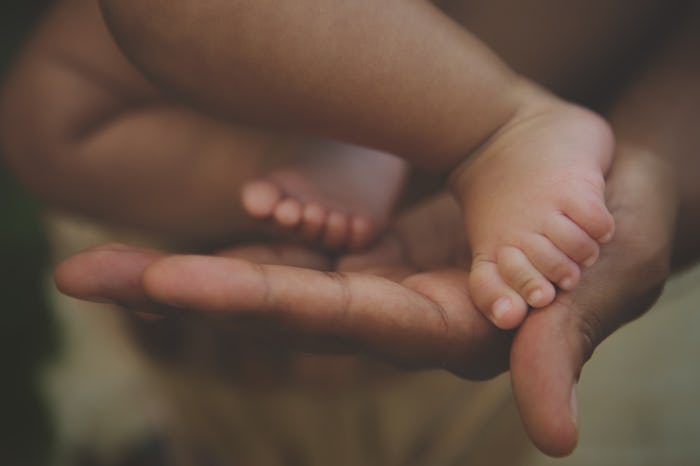Life
Dad Who Lost His Wife To Postpartum Depression Is Speaking Out
It's been nearly six years since Steven D'Achille tragically lost his wife to postpartum depression and he continues to speak out about his heartbreaking story in order to raise awareness for perinatal mental health. D'Achille, an activist and dad to 5-year-old Adriana, is working tirelessly to ensure that parents suffering from this condition receive the help they need and deserve.
D'Achille recently opened up about his difficult story via the Allegheny Health Network's website, reliving the moments that led up to the untimely death of his wife, Alexis Joy D’Achille, in October 2013. After enjoying the "most seamless, perfect pregnancy," Alexis gave birth to the couple's first daughter on Aug. 30, 2013. Although Alexis was overjoyed to have a daughter, she began to struggle with her mental health.
"My mother-in-law was with us for two-and-a-half weeks after Adriana was born," he wrote. "Everyone always says, ‘Watch out for the baby blues.’ And then as soon as my mother-in-law left, it was very apparent that this was much more severe than the baby blues. It was literally watching somebody you love just completely fall apart and unravel."
D’Achille shared that Alexis was experiencing a multitude of concerning symptoms, including hearing "phantom baby cries in the night," difficulties with breastfeeding, and she was possibly exhibiting symptoms of post-traumatic stress disorder. Doctors thought it was possible that Alexis was traumatized due to the umbilical cord wrapping around Adriana's neck during delivery, according to D’Achille, and the new mom was convinced that the birth somehow had hurt her baby.
D’Achille's wife was open about her struggle and had booked an appointment with a doctor. But Alexis had to wait two months to get into the office, and during this time, she "took her own life," six weeks postpartum, according to the post shared to Allegheny Health Network's website.
Since Alexis' death, D’Achille has taken it upon himself to draw awareness to postpartum depression and to champion accessible health care for all.
"One thing I’ve definitely learned was that mental health does not discriminate," the dad, who launched the Alexis Joy D’Achille Foundation for Postpartum Depression, stated, according to the Pittsburgh Tribune-Review. "It doesn’t care who you are. It could be anyone. It could be any woman. We knew she was in trouble, and we begged for help. And it just wasn’t there."
D’Achille also highlights Alexis' story on his personal Facebook page, as evidenced by this touching photo he shared of his late wife posing with Adriana when she was an infant.
"This is the last picture ever taken of my wife with our daughter Adriana," he captioned the moving shot on Sunday, May 5. "The following morning Alexis took her life. #MyWishForMoms is that no mom has to feel like Alexis did. #MyWishForMoms is that every mom gets to watch their babies grow up."
He continued, "#MyWishForMoms is that no mom feels like their loved ones are better off without them here. That no mom feels they are a burden."
D’Achille ended his post with a public plea, stating:
My wish for this post is that everyone male or female that reads it posts their own #MyWishForMoms for a woman they know and love... For anybody desperately seeking helpwww.postpartum.net is a free resource for all moms.
The #MyWishForMoms hashtag was actually started by Chrissy Teigen in hopes of highlighting maternal mental health struggles. "I wish I had known that postpartum depression can happen to anyone because I didn’t think it could happen to me," she wrote in a press release about her partnership with Allegheny Health Network, according to Glamour. "Here I was, with my perfect little Luna and a supportive husband, yet I was truly struggling."
Foundations like the Alexis Joy D’Achille Foundation for Postpartum Depression and advocates like Chrissy Teigen are essential in making postpartum depression a top health concern in the United States. As it should be, as roughly 85 percent of women "experience some type of mood disturbance" during the postpartum period, according to The MGH Center for Women’s Mental Health. Parents need better resources, accessible health care, and a trusted forum in which to share their concerns and to get the help they deserve.
If you or someone you know is experiencing depression or anxiety during pregnancy, or in the postpartum period, contact the Postpartum Health Alliance warmline at (888) 724-7240, or Postpartum Support International at (800) 944-4773. If you are thinking of harming yourself or your baby, get help right away by calling the National Suicide Prevention Lifeline at 1-800-273-8255, or dialing 911. For more resources, you can visit Postpartum Support International.
